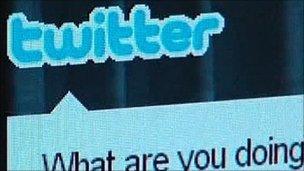Talk of a new privacy law following super-injunctions
- Published

Social networking site Twitter is under scrutiny
Among my picks of Wednesday's main media stories are reports on government plans to clarify the confusion over the laws relating to privacy in the UK.
The ministers will hold emergency talks over the celebrity super-injunction confusion that could pave the way to a privacy law and an attempt to regulate social networking sites. As the names of public figures alleged to have taken out gagging orders continued to circulate freely on Twitter and in foreign newspapers, Culture Secretary Jeremy Hunt said the proliferation of information on the web had made a "mockery" of current privacy rules.
Max Mosley, the former Formula One boss, lost his legal challenge to force newspapers to warn people before publishing stories exposing their private lives, after a European court ruled on Tuesday that such as system would have a "chilling effect" on the press. The law firm that while Mr Mosley has the right to appeal, the judgment is so "decisive" that his chances of overturning it "look poor".
the ҙуПуҙ«ГҪ for "lavishing money" on The Apprentice, which began a new series last night. "While was chairman of Channel 4, we had a big hit with Jamie's School Dinners, which focused on the quality of food in educational establishments. But the ҙуПуҙ«ГҪ is the ultimate public service broadcaster: it needs to work to the highest standards" he says. "It can afford to make original transmissions, thanks to the compulsory ВЈ3bn tax it levies in the form of a licence fee. Instead, it lavishes money on tired formats such as The Apprentice, lacking the imagination or courage to invest in more challenging fare about entrepreneurship - programmes that would offer practical guidance to those thinking of founding a business."
The Apprentice was . He says he is very familiar with people being sniffy about the programme. But that serious retail brains criticise it viciously to him and will add: 'Lorraine didn't drop the price early enough in the day.' "Everybody watches it" he says, "even those who protest it's the most fearful rubbish - which, incidentally, it isn't. We know it's doing a great job for young people, making them interested in business. I go to schools all the time and that's what I hear."
"Security guards zooming around on high-tech Segway vehicles and giant neon hamster-wheel-style seating booths: This was the sight that greeted visitors yesterday as the ҙуПуҙ«ГҪ unveiled its new northern base", . The Corporation displayed the MediaCity UK complex in Salford to journalists, as it emerged that it faces an estimated ВЈ12m bill just to help staff to find new homes nearby.
There are no plans to put The Sun behind the News International paywall, a senior figure at the company has said. It remains the only newspaper in its UK stable that remains free. The it was anticipated that Britain's biggest-selling daily newspaper would charge, but News International's chief marketing officer Kate Vanneck-Smith said there were no immediate plans to do so.
The first anniversary of the coalition is a low-key affair for the papers. The Daily Telegraph said that for all the ups and downs, the government is actually doing reasonably well, as reported in the ҙуПуҙ«ГҪ's newspapers review.